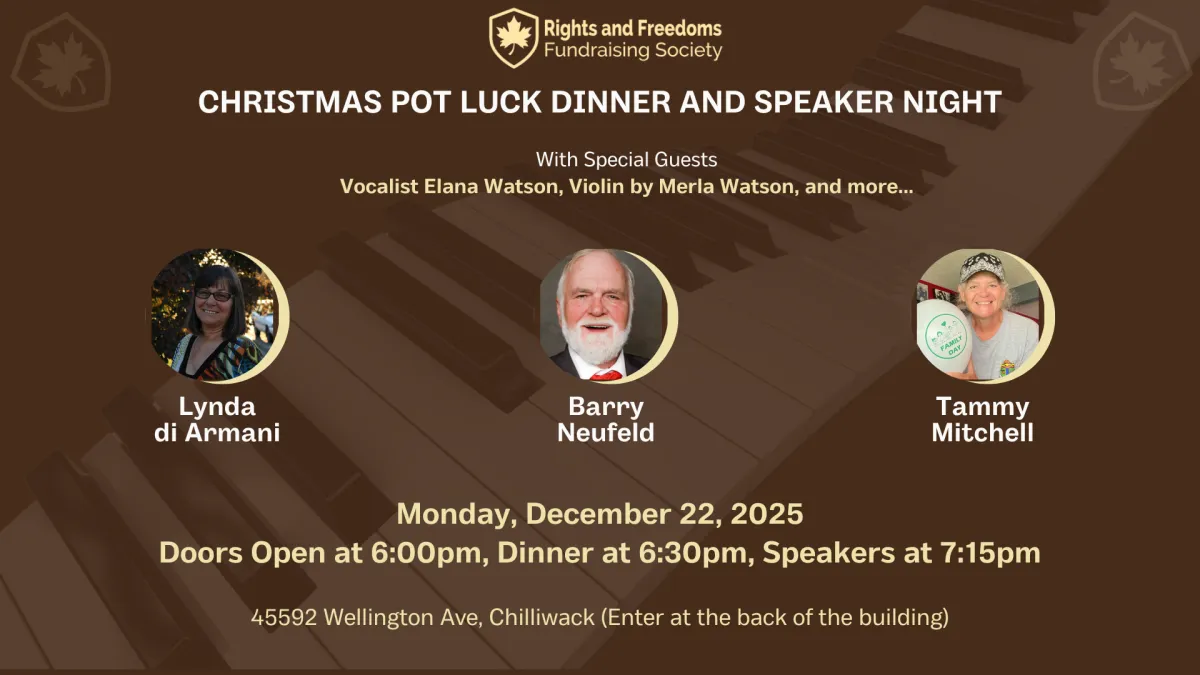You are invited to a very special evening in Chilliwack.
Good food. New friends. Great fellowship.
A shared stand for our Rights and Freedoms.
Date:
Location:
Time:
Monday, December 22, 2025
45592 Wellington Ave, Chilliwack (Enter at the back of the building)
Doors open 6:00 pm, Dinner at 6:30 pm, Speakers at 7:15 pm
Date: Monday, December 22, 2025
Location: 45592 Wellington Ave, Chilliwack (Enter at the back of the building)
Time: Doors open 6:00 pm, Dinner at 6:30 pm, Speakers at 7:15 pm

A Night To Celebrate What Matters
This Christmas you can do more than hang another ornament. You can sit down with people who care about our community, enjoy a homemade meal together, listen to uplifting speakers, and help strengthen the work of the Rights and Freedoms Fundraising Society.
Every seat at the table helps us raise funds so we can keep standing for the fundamental rights and freedoms that protect our families, our communities, and future generations of Canadians.
You get a meaningful night out.
Our shared cause gets the support it needs.
Pot Luck Christmas Dinner
Nothing feels like home quite like a pot luck.
Bring a favorite main dish, salad, or dessert to share, and join a table full of friends, neighbors, and fellow supporters.
Together we will create a Christmas feast that reflects the generosity of this community.
🤎 Doors open at 6:00 pm for drop off and social time
🤎 Pot luck dinner begins at 6:30 pm
🤎 Coffee, tea, cream, and water provided
If you are not able to bring something, come anyway. Your presence is welcome at the table.
Evening Lineup
After dinner, stay for an inspiring evening of speakers and stories from the people helped by the Rights and Freedoms Fundraising Society.
Featured Guests
🎤 Lynda di Armani
🎤 Tammy Mitchell
🎤 Barry Neufeld
Speakers start about 7:15 pm. You are free to relax, listen, and enjoy the atmosphere
Your Gift Makes A Real Difference
Whether you attend in person or cannot be there at all, you can strengthen this work with a financial gift.
Give Before The Event
Help us cover event costs and fund key projects in advance.
Your early donation allows more of the money raised during the evening to go directly to the ongoing work of the Rights and Freedoms Fundraising Society.
Whether you attend in person or cannot be there at all, you can strengthen this work with a financial gift.
Give Before, During, or After The Event
Inspired by the stories you heard that night?
Want to share the blessing after you get home?
Return to this page to make a secure online donation any time.
You can give a one time gift or set up a monthly contribution that carries the impact of this evening into the new year.
Your generosity:
🤎 Fuels education, advocacy, and community events
🤎 Gives a voice to those who feel unheard
🤎 Helps defend the rights and freedoms that belong to all of us
Join us Monday, December 22, 2025, in Chilliwack for a Christmas Pot Luck Dinner and Speaker Evening that feeds your body, lifts your heart, and supports a cause that truly matters.
Thank You!

Stay Informed
Stay informed with the latest updates on our cases, research and events.
©️ Copyright 2025 Rights and Freedoms Fundraising Society. All Rights Reserved.